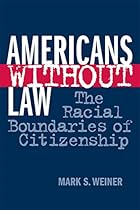Read Americans Without Law: The Racial Boundaries of Citizenship by Mark S. Weiner Online
[Mark S. Weiner] ✓ Americans Without Law: The Racial Boundaries of Citizenship ↠ Download Online eBook or Kindle ePUB. Americans Without Law: The Racial Boundaries of Citizenship Weiner calls “juridical racialism.” The book follows the history of this civic discourse by examining the legal status of four minority groups in four successive historical periods: American Indians in the 1880s, Filipinos after the Spanish-American War, Japanese immigrants in the 1920s, and African Americans in the 1940s and 1950s.Weiner reveals the significance of juridical racialism for each group and, in turn, Americans as a whole by examining the work of anthropological social s

| Title | : | Americans Without Law: The Racial Boundaries of Citizenship |
| Author | : | |
| Rating | : | 4.51 (544 Votes) |
| Asin | : | 0814793649 |
| Format Type | : | paperback |
| Number of Pages | : | 205 Pages |
| Publish Date | : | 2014-04-07 |
| Language | : | English |
An Anthropological Explanation for Changes in Legal Doctrine Daniel Baum If the American constitution is only amended infrequently, why do the legal interpretations of it vary so much? Looking at judicial decisions over this country's history, the same constitutional lines have justified seemingly opposing decisions at different times. Mark Weiner's goal in Americans without Law: The Racial Boundaries of Citizenship is to explain just how that is possible. He claims that we can best understand these changes in American judicial doctrine through "an in. The Legal Boundaries of Citizenship Revisited Thousands of ambitious pre-law students all across America received their LSAT scores online this past weekend. This score, ranging from 120 to 180, can make or break a student's admission to a top tier law school. In this sense, entrance into the realm of law school and the comprehension of the complex legal system appears to be technical and defined by arbitrary numerical values. However, it remains to be seen that the complexity and breadth of information encompassed by the Am
Weiner is Professor of Law at Rutgers School of Law, Newark. He is the author of Black Trials: Citizenship from the Beginnings of Slavery to the End of Caste, winner of the American Bar Association's 2005 Silver Gavel Award.. Mark S
“Commendably and profoundly, the author maps the numerous uncharted waters of racial discrimination showing how anthropology and culture intermix with law to form wide-ranging and lasting policies of exclusion.”-New York Law Review“An enthralling mixture of personages and cases that reveals much about the intimate combining of law and “American” imperialism, including the complicities of scholarship.”-Peter Fitzpatrick,Birkbeck School of Law, University of London“A rich and exceptiona
Weiner calls “juridical racialism.” The book follows the history of this civic discourse by examining the legal status of four minority groups in four successive historical periods: American Indians in the 1880s, Filipinos after the Spanish-American War, Japanese immigrants in the 1920s, and African Americans in the 1940s and 1950s.Weiner reveals the significance of juridical racialism for each group and, in turn, Americans as a whole by examining the work of anthropological social scientists who developed distinctive ways of understanding racial and legal identity, and through decisions of the U.S. Supreme Court that put these ethno-legal views into practice. Americans Without Law shows how the racial boundaries of civic life are based on widespread perceptions about the relative capacity of minority groups for lega
Download Americans Without Law: The Racial Boundaries of Citizenship
Download as PDF : Click Here
Download as DOC : Click Here
Download as RTF : Click Here
